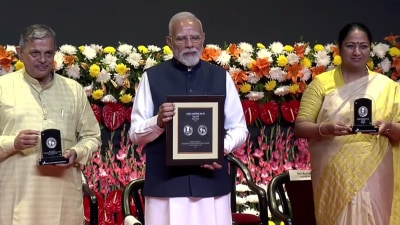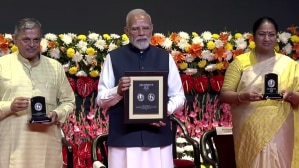FM away, Cabinet puts off decision on judges’ pay
With the Finance Ministry recommending a cut in the three-fold salary hike for members of the higher judiciary proposed by a judges’ panel, Law Minister H R Bhardwaj put his weight behind the judiciary’s recommendations and said there was a need to delink the salary structure from those of the administrative services.

With the Finance Ministry recommending a cut in the three-fold salary hike for members of the higher judiciary proposed by a judges’ panel, Law Minister H R Bhardwaj on Thursday put his weight behind the judiciary’s recommendations and said there was a need to delink the salary structure from those of the administrative services.
While the Union Cabinet deferred a decision on the issue on Thursday due to the absence of Finance Minister P Chidambaram, sources confirmed that no other minister raised any objection to the salary and allowances proposed by the panel. The ministry also wanted a cut in the proposed salary of the CJI — the panel had recommended a salary of Rs 1.10 lakh per month, equivalent to that of the Governors, but Bhardwaj is learnt to have opposed this citing the judiciary as an important constitutional pillar in the governing set-up of the country.
The Finance Ministry had recommended cuts in proposed allowances or status quo in expenses allowed currently. It suggested that the salaries of SC judges and High Court Chief Justices be pared down to bring them at par with what the Cabinet Secretary of the Government of India is entitled to under the Sixth Pay Commission. Similarly, the salary of a sitting judge of the HC has also been recommended to be cut to Rs 80,000 per month, equivalent to that of Secretary level.
In another major decision, the Cabinet Committee on Economic Affairs (CCEA), which met under the chairmanship of Prime Minister Manmohan Singh, approved cluster development projects in six identified clusters in the textile sector. Chavan said the project will be implemented at an expenditure of Rs 70 crore each in the PPP model at Moradabad (UP) and Narsapur (Andhra Pradesh) for handicrafts, Bhiwandi (Maharashtra) and Erode (Tamil Nadu) for powerloom, and Varanasi (UP) and Sibsagar (Assam) for handloom.
The Cabinet is also learnt to have agreed on a scheme to supply pulses at subsidised prices through ration shops in the next one-and-half months. However, the Cabinet did not announce the decision given the election code of conduct in place for the Assembly elections in six states.
OTHER DECISIONS
• The Cabinet approved a proposal for construction and maintenance of a samadhi of late Prime Minister Chandrashekhar at the spot of his cremation.
• The CCEA approved a Rs 275-crore electrification and illumination project for the villages at the International Border in Arunachal Pradesh.
• The CCEA approved a scheme for strengthening and developing higher agricultural education with an expenditure of over Rs 2,276 crore during the Eleventh Plan.
• The Cabinet also approved setting up of a Ghani Khan Choudhary Institute of Engineering and Technology as a centrally sponsored institution at Malda in West Bengal at Rs 97 crore.
• The Cabinet also decided to provide about Rs 764 crore as financial support for the mitigation of the agrarian distress in Idukki district of Kerala as part of the rehabilitation package for farmers in 31 suicide prone districts announced by the Prime Minister two years ago.
• In order to provide better protection of Indian Trade Marks in the global market, it approved modifications into the Trade Marks (Amendment) Bill, 2007.
• It also approved introduction of Information Technology (Amendment) Bill, 2006 in Parliament based on the recommendations of Parliamentary Standing Committee
• The Cabinet also approved setting up of the UNESCO Regional Centre for Training and Education in Biotechnology at Faridabad, Haryana at an estimated budget of about Rs 100 crore.
• The Cabinet has upgraded the posts of members of the Central Board of Direct Taxes and the Central Board of Excise and Customs to the level of special secretary, which will ensure a salary of Rs 80,000 per month for them.



- 01
- 02
- 03
- 04
- 05




























